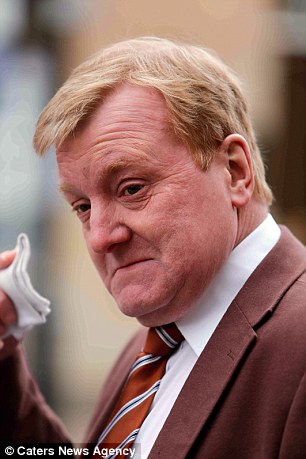Charles Peter Kennedy (25 November 1959 – 1 June 2015) was a British Liberal Democrat politician who was Leader of the Liberal Democrats from 1999 to 2006, and a Member of Parliament (MP) from 1983 to 2015.
Kennedy was elected to the House of Commons in 1983, and after the Alliance parties merged, became President of the Liberal Democrats and, following the resignation of Paddy Ashdown, Leader of the Liberal Democrats. He led the party through two general elections, increasing its number of seats in the House of Commons to their highest level since 1923, and led his party’s opposition to the Iraq War. A charismatic and affable speaker in public, he appeared extensively on television during his leadership.

During the latter stages of Kennedy’s leadership, there was concern about both his leadership and his health. From December 2005, some within the party were openly questioning his position and calling for a leadership election. On 5 January 2006, he was informed that ITN would be reporting that he had received treatment for alcoholism; he pre-empted the broadcast by admitting that he had had treatment, and called a leadership election in which he intended to stand. After Menzies Campbell succeeded him as leader, Kennedy remained in office as a backbench MP, where he voted against the formation of the Cameron–Clegg coalition, before his death less than a month after being unseated from the House of Commons in 2015.
Early life
Fort William, Highland
Kennedy was born on 25 November 1959 in the Scottish Highlands town of Inverness, the son of Mary and Ian Kennedy. He had a Roman Catholic upbringing, and was educated at Lochaber High School in Fort William. He went on to study for a Master of Arts degree in Politics and Philosophy at the University of Glasgow. Kennedy first became politically active at university, where he joined the SDP as well as the Dialectic Society. Between 1980 and 1981, Kennedy was President of the Glasgow University Union. He won the Observer Mace debating competition in 1982, speaking with Clark McGinn.
Upon graduation in 1982, Kennedy went to work for BBC Scotland as a journalist. He later received a Fulbright Fellowship which allowed him to carry out research at Indiana University in the United States.
Early political career.
At the age of 15 he joined the Labour Party, followed in 1981 by the newly formed Social Democratic Party. Two years later, Kennedy received the SDP nomination to stand for the Scottish seat of Ross, Cromarty and Skye—then held by the Conservative Hamish Gray—at the 1983 general election. Kennedy won the seat with 13,528 votes (38.5%) and a majority of 1,704, unseating the incumbent Gray. He was, at the age of 23, the youngest sitting Member of Parliament at the time he was elected to the House of Commons. He served on the Social Services select committee from 1985 to 1987, retained his seat at the 1987 general election, and served on the Televising of Proceedings of the House select committee from 1987 to 1989.
Personal life
In July 2002, Kennedy married Sarah Gurling, the sister of his friend James Gurling. They had a son, Donald, who was born in 2005. On 9 August 2010, it was announced that Kennedy and his wife were to separate, and their divorce was granted on 9 December 2010.
In July 2007, Kennedy was informally spoken to by the British Transport Police after he breached the English smoking ban on a train a few days after it came into force.
Kennedy’s father Ian, to whom he was close, died in April 2015; just two months before his son’s death. He had been a brewery worker but a lifelong teetotaller. Kennedy had chosen a recording of his father’s fiddle playing when he appeared on Desert Island Discs.
Death
Kennedy lost his seat at the 2015 United Kingdom general election to Ian Blackford of the Scottish National Party, amid a nationwide loss of forty-nine seats for the Liberal Democrats. Kennedy died on the evening of 1 June 2015 at his home in Fort William at the age of 55. Kennedy’s death was announced in the early hours of the following day. The police described his death as “sudden and non-suspicious”. Following a post-mortem, his family announced that Kennedy had died of a major haemorrhage linked to his alcoholism.
A funeral mass was held on 12 June at his parish church, St John’s Roman Catholic Church, in Caol near Fort William, and his body was buried at his family’s cemetery at Clunes. A service of thanksgiving was held at the University of Glasgow on 18 June and it was announced that the university would be fund-raising to name a teaching area in memory of him. A memorial service was held in St George’s Cathedral, Southwark, London, on 3 November.
Discover more from WILLIAMS WRITINGS
Subscribe to get the latest posts sent to your email.